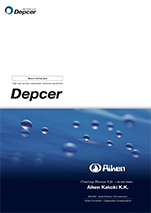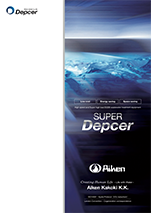BUSINESS
 Energy utilization of
Energy utilization of
industrial wastewater
"What is the EGSB method?"
The EGSB method (Expanded Granular Sludge Bed method) is a wastewater treatment process in which organic matter in wastewater is separated into water, methane gas, and sludge through the action of anaerobic microorganisms (granules). This method is gaining attention as a highly energy-efficient wastewater treatment technology.
Features of the EGSB method
Energy efficiency
Since oxygen supply to microorganisms is not required, the power consumption is lower compared to aerobic treatment, which reduces running costs.
Energy generation potential
The biogas produced by microorganisms during the degradation of wastewater can be recovered and utilized as energy for generators or boilers
Contribution to SDGs and Decarbonization
Contribution to SDGs and Decarbonization: By converting organic matter in industrial wastewater into biogas, the amount of excess sludge generated is reduced by approximately 1/5 to 1/10 compared to aerobic treatment.
Utilization of external funding
It is possible to utilize external funding such as the FIT system (Feed-in Tariff for renewable energy) and the SHIFT program (Leading Decarbonization Initiative) when introducing equipment.
Applicable Industries
This primarily applies to industries in the food and chemical sectors, including breweries, distilleries, soft drinks, food processing, prepared foods, dairy, dairy products, sauces, soy sauce, fermented foods, sugar manufacturing, sweeteners, seasonings, confectionery, baking, bean paste production, seafood processing, paper, pulp, and textile factories.
Patented Technology
Net-Zero Energy (Fully Autonomous Circulating) Wastewater Treatment System
Conventional EGSB methods have historically encountered challenges related to treatment performance stability and limitations in energy recovery, which have impeded economic feasibility relative to capital investment, posing barriers to widespread implementation. In response, our company has developed and patented an advanced, fully autonomous circulating system achieving complete net-zero energy dependence. This system capitalizes on high-efficiency methane fermentation for power generation and incorporates recovery of residual heat from wastewater and generator output. This innovation enables a substantial improvement in operational stability, efficiency, and cost-effectiveness.
| Distinctive Features of the Conventional EGSB |
|---|
| Net-Zero Energy (Fully Autonomous Circulating) |
| High Energy Recovery Rate |
| High Waste Heat Recovery Efficiency |
| Granule Maintenance and Management Expertise |
| Short Investment Payback Period |



